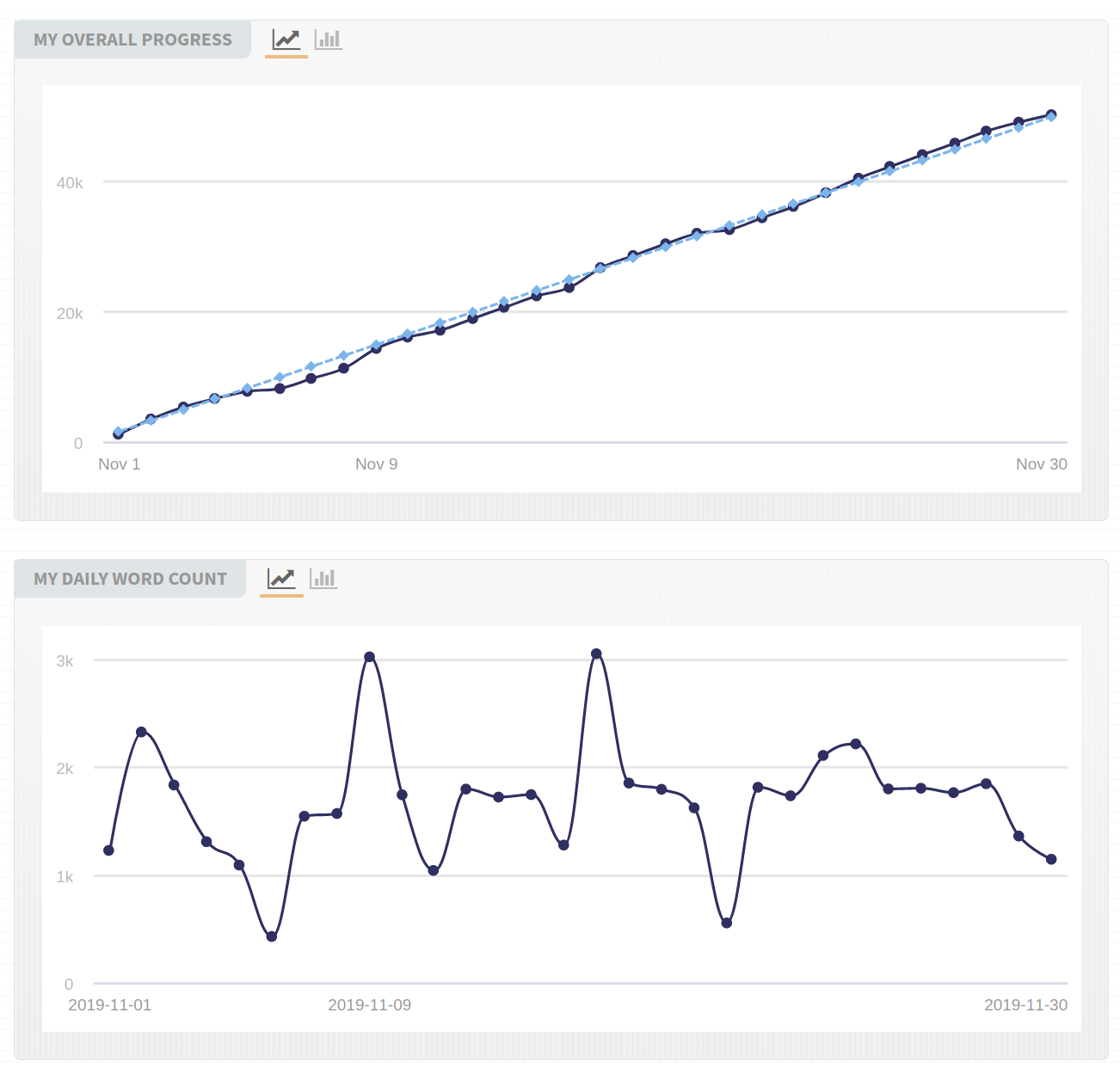Nanowrimo 2019
This year I participated to NaNoWriMo: the National Novel Writing Month, which takes place in November every month. It was started in the US in 1999, and it’s grown to a worldwide phenomenon. The challenge: write 50000 words - a novel’s worth of words - in a month. Or about 1750 words a day. I’ve wanted to participate for years, but never quite got around to it. Life got in the way, or I forgot and remembered mid-november. This year, I was ready. It was time.
Preptober
For all my readiness I completely missed that Nanowrimo is preceded by Preptober: a month to prepare your novel. I came to regret missing this stage - it’s much easier to write a novel when you have laid out the groundwork. I figure next time I write a book I’ll try to:
- have an overal plotline - or timeline - or set of plotlines ready
- do research into less familiar areas - read books on related topics for inspiration. How does the air smell when you come out of the plane in Bamako?
- have a little bit of profile around main characters
Once you have the plot laid out in broad lines, keeping a coherent, consistent thread is easier, and you can just concentrate on the writing instead of figuring things out as you go. Research can be an extra source of inspiration, adding aspects of plot that make everything more realistic, adding texture.
As far as I can tell, is a spectrum of desired degree of preparedness amongst writers: some writers prefer to write blind and let the characters shape the story, some script everything in the most minute detail.
Worth noting that for me, writing a long form without preparation did help me figure out what would help, which I would not have known beforehand.
The website
Nanowrimo is backed by a non-profit which is dedicated to helping all aspiring to write their 50000 words. There is a website which helps you track stats. The website has gamification down: the graph of progress is really helpful to see whether you’re on track.

More importantly, they point wannabe participants to their geographical region’s chapter of writers. Every region in the world has a few organizers who organize the community. Which brings me to next point.
The community
I’m not sure I would have finished this year’s nano without the Bristol & Bath writers group. We had a Discord channel (an app I’d only used in the context of gaming), which was a point of contact with other participants. It was a good place to moan, to exchange banter with other fellow sufferers. You could try and help each other out when you were blocked, or rubber duck a finer plot point, or cheer on someone who’d written more than they’d expected to.
Sometimes, on the Discord channel, we had sprints: 15 minutes stretches where people competitively tried to produce as many words as possible, and then recorded the result in the channel. You then got XP from the resident bot, and leveled up accordingly.
There were regular physical write-ins too, get-togethers in a cafe or a restaurant where everyone brought their laptop or notepad and sat writing together while consuming beverages.
I was surprised by the number of participants in the region. I think about 20 of us finished Nano in Bath and Bristol alone. Some of those people had participated for many years. Some, interestingly, got their 50000 words written in the first 10 days, literal human avalanches of the written word.
Flow
Nanowrimo is a marathon-worthy effort. I struggle to write a 1000 words in a day, let alone 1750. And I had to start grafting after having worked a full day and having put my daughter to bed. It was physically exhausting.
But it became easier after a while. I got into a groove of planning my next steps in the morning commute on the train, when brain wasn’t too fried yet, which meant that I could just execute on the ideas in the evening. There was a trick to progress: which situation do I want the plot to move to, and how do I set it up? I got into the habit of writing down ideas in my notebook when they popped up. I tried to produce more in the weekends on off moments, to compensate for difficult week nights.
I spoke to another Bath amateur writer who said that she doesn’t participate to nanowrimo anymore: she prefers to write less (minimum 50 words/day), but every day, over a longer period of time. I think that is wise and more sustainable - I was pretty burned out for most of December, and only now do I feel I could start writing again.
While I have my reservations about the process, I found it a valuable experience. Forcing myself to write high volumes of questionable prose did unblock the writing, and highlighted what was missing in my process and style. I’m not sure I’ll be able to use the output - not without rewriting it extensively - but I did push through, from start to finish, and in so doing proved myself it could be done.
I think the next challenge is editing a draft, any draft, and make it work properly. I don’t have a very clear idea how to achieve this - it might be even harder, and more arduous, than writing a first draft. I’m pretty pig-headed though. The journey continues.